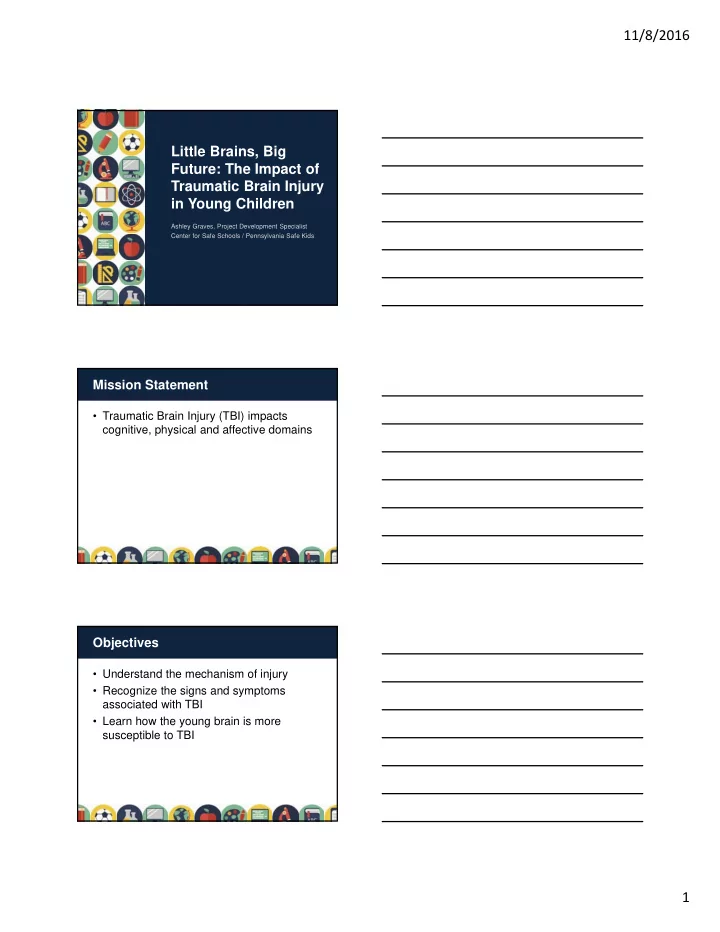

11/8/2016 Little Brains, Big Future: The Impact of Traumatic Brain Injury in Young Children Ashley Graves, Project Development Specialist Center for Safe Schools / Pennsylvania Safe Kids Mission Statement • Traumatic Brain Injury (TBI) impacts cognitive, physical and affective domains Objectives • Understand the mechanism of injury • Recognize the signs and symptoms associated with TBI • Learn how the young brain is more susceptible to TBI 1
11/8/2016 Statistics • CDC Reports: – Estimates 1.7 million people sustain a TBI every year – 473,947 ED visits, 2,685 deaths, 37,000 hospitalizations (children 0-14) for TBI annually – Each year an average of 62,000 children sustain brain injuries requiring hospitalization as a result of motor vehicle crashes, falls, sports injuries, physical abuse and other causes (children 0-19) Traumatic Brain Injury (TBI) Causes • Bump • Blow • Jolt • Penetrating head injury Polling Question • At what age have all the brain sutures closed – 3-9 months of age – 5-10 months of age – 15-18 months of age – 22-39 months of age 2
11/8/2016 Basic Anatomy Brain Anatomy Cont. Polling Question • At what age is the brain fully developed? – 13 years of age – 18 years of age – 21 years of age – 25 years of age – 27 years of age 3
11/8/2016 Brain Lobes • Frontal • Parietal • Occipital • Temporal Memory • Short-term • Long-term • Skill Mechanism of Injury • Falls from any distance • Falls while standing, walking, or running • Collisions with a stationary object when walking or running • Motor vehicle crashes • Bicycle crashes • Child abuse 4
11/8/2016 Coup vs. Contrecoup Rear-facing vs. Forward-facing Rear-facing vs. Forward-facing 5
11/8/2016 Polling Question • How many states have a law that pertains to rear-facing car seats? – 4 – 15 – 32 – 50+ D.C., Guam, Northern Mariana Islands, Puerto Rico, and U.S. Virgin Islands. Concussion/Mild Traumatic Brain Injury • Concussion – a form of mild traumatic brain injury (mTBI) • Disruption in normal brain function • Trauma induced alteration in mental status Severe TBI Types • Closed • Penetrating 6
11/8/2016 Severe TBI • TBI contributing factor to 30.5% of all injury-related deaths in the U.S. • Non-fatal severe TBI may result in extended period of unconsciousness (coma) or amnesia after injury • Hospitalized after TBI – 43% have related disability one year after injury CDC, 2012; 2015 Physical Symptoms • Headaches • Light sensitivity • Crying • Dizziness • Inability to be • Fatigue consoled • Drowsiness • Restlessness • Noise sensitivity • Nausea • Balance problems • Vomiting • Visual problems • Change in nursing or eating habits Cognitive Symptoms • Feeling mentally foggy • Difficulty concentrating • Problems remembering • Difficulty problem solving • Short term memory loss 7
11/8/2016 Emotional (Affective) Symptoms • Irritability or increase temper tantrums • Sadness or becoming upset easily • Depression • Anxiety • Nervousness • Feeling overall more emotional Sleeping Symptoms • Drowsiness • Sleeping more or less than usual • Insomnia • Trouble sleeping or falling asleep Post-TBI Difficulties • Concentration, attention span • Headaches • Visual scanning • Irritability or change in attitude 8
11/8/2016 Red Flag Symptoms • Excessive crying • Slurred speech • Change in sleep • Lacking recognition of pattern people or date/place • Will not nurse or eat • Increasing confusion • Loss of consciousness • Unusual behavior change • Seizures • Worsening/Persistent • Cannot stay awake headaches • Repeated vomiting • Ringing of ears • Increased irritability Management Team • Determination of appropriate therapy and recovery options • On-going communication between all members Team Members • Caregivers • Daycare provider(s) • Pediatrician/Primary care physician (PCP) • Neurologist • Speech pathologist • Occupational Therapist • Physical Therapist 9
11/8/2016 Treatment • Rest • Medication • Environment management • Minimize visual scanning Recovery • Depends on history • Mild TBI should clear in 2-3 weeks • Short-term & long-term consequences • Can be life-altering Child vs. Adult Child Adult • Less muscle mass • Less vulnerable • Head proportion to • Shorter recovery time body • Less symptoms • More vulnerable • Unconsciousness is • Longer recovery more common • More symptoms • Unconsciousness is very uncommon 10
11/8/2016 Prevention of TBI • Wearing seat belt or using a properly fitted and installed child passenger safety seat • Wearing properly fitted protective equipment (ex. Helmet) • Playground surfaces are made with shock- absorbing materials • Making living areas safer Prognosis • People with history of concussions are more susceptible to another one • Repeated TBIs may increase risk of developing dementia, CTE, Parkinson’s disease and depression later in life. (Covassin, Stearne, Elbin, 2008). Polling Question • Second Impact Syndrome occurs when an individual experiences a second blow within the same day. • True or False 11
11/8/2016 Second Impact Syndrome • Suffering a second collision before completely healing • Resulting in death, severe TBI or prolonged recovery from initial injury • Loss of cerebral auto regulation of vascular control Chronic Traumatic Encephalopathy (CTE) • Progressive degenerative brain disease • People with history of repetitive brain trauma BRAIN BANK 12
11/8/2016 Post-Concussion Syndrome (PCS) • Symptoms do not resolve for weeks, months or years • No scientific protocol to treat condition • Typically symptoms subside within a few months Neuropsychological Testing ImPACT • Used in medical field for management of concussions • Computer based assessment of cognitive functioning ImPACT Results 13
11/8/2016 References Centers for Disease Control and Prevention www.cdc.gov/TraumaticBrainInjury/index.html Brain Anatomy, Mayfield Clinic www.mayfieldclinic.com/PE-AnatBrain.htm#.Va1B4PlVhHw www.swata.org/statistics www.brainline.org www.biausa.org Contact Ashley Graves Project Development Specialist Center for Safe Schools / Pennsylvania Safe Kids (717) 763-1661 ext. 131 agraves@csc.csiu.org 14
Recommend
More recommend